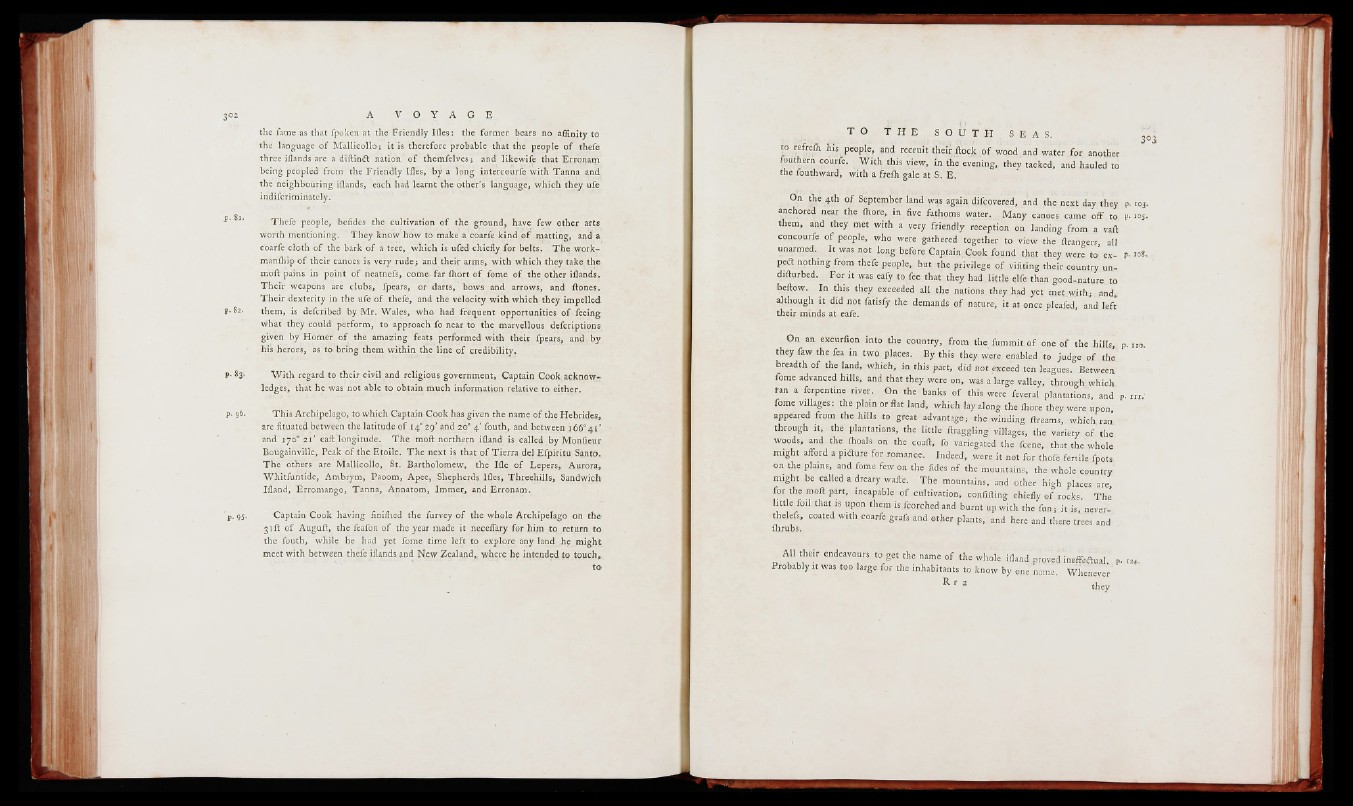
the fame as that fpoken at the Friendly Ifles: the former bears no affinity to
the language of Mallicollo; it is therefore probable that the people of thefe
three iflands are a diftindt nation of themfelvesj and likewife that Erronam
being peopled from the Friendly Ifles, by a long intercourfe with Tanna and
the neighbouring iflands, each had learnt the other’s language, which they ufe
indifcriminately.
■*>‘ I" Thefe people, befides the cultivation of the ground, have few other arts
worth mentioning. They know how to make a coarfe kind, of matting, and a
coarfe cloth of the bark of a tree, which is ufed chiefly for belts. The workman
ihip of. their canoes is very rude; and their arms, with which they take the
moll: pains in point of neatnefs, come- far ihort of fome of the other iflands.
Their weapons are clubs, ipears, or darts, bows and arrows, and ilones.
Their dexterity in the ufe of thefe, and the velocity with which they impelled
p. 82. them, is defcribed by Mr. Wales, who had frequent opportunities of feeing
what they could perform, to approach fo near to the marvellous defcriptions
given by Homer o f the amazing feats performed with their fpears, and , by
his heroes, as to bring them within the line of credibility.
p. 83. With regard to their civil and religious government, Captain Cook acknowledges,
that he was not able to obtain much information relative to either.
p. 96. This Archipelago, to which Captain Cook has given the name of the Hebrides,
are fituated between the latitude of 140 29’ and 200 4’ fouth, and between i66°4i*
and 170° 21’ eafl: longitude. The moil northern ifland is called by Monfieur
Bougainville, Peak of the Etoile. The next is that of Tierra del Efpiritu Santo.
The others are Mallicollo, St. Bartholomew, the Ifle of Lepers, Aurora,
Whitfuntide, Ambrym, Paoom, Apee, Shepherds Ifles, Threehills, Sandwich
Ifland, Erromango, Tanna, Annatom, Immer, and Erronam.
p. 95* Captain Cook having finiihed the furvey of the whole Archipelago on the
31ft of Auguil, the feafon of the year made it neceflary for him to return to
the fouth, while he had yet fome time left to explore any land he might
meet with between thefe iflands and New Zealand, where he intended to touch,
t o
to refreft ¿is people, and recruit their ftock of wood and water for another
fouthern courfe. With this view, in the evening, they tacked, and hauled to
the fouthward, with a freih gale at S. E.
On Ae 4th of September land was again difcovered, and the next day they p. 103.
anchored near the ihore, in live fathoms water. , Many canoes came off to. p. 105.
them, and they met with a very friendly reception on landing from a vaft
concourfe of people, who were gathered together to view the ftrangerp, all
unarmed. It was not long before Captain Cook found that they were to ex- P- 108.
peiff npthing from thefe people, but the privilege of vifiting their country un-
difturbed. For it was eafy to fee that they had little elfe than good-nature to
bellow. In this they exceeded all the nations they had yet met with; and,
although it did not fatisfy the demands of nature, it at once pleafed, and left
their minds at eafe.
On an excurfion into the country, from the fummit of one of the hills, p. no.
they faw the fea in two places. By this they were enabled to judge of the
breadth of the land, which, in this part, did not exceed ten leagues. Between
fome advanced hills, and that they were on, was a large valley, through which
tan a ferpentine river. On the banks of this were feveral plantations, and p. nr.
fome villages: the plain or flat land, which lay along the lhore they were upon,
appeared from the hills to great advantage; the winding, ftreams, which ran
through it, the plantations, the little ftraggling villages, the variety of the
woods, and the ihoals on the coaft, fo variegated the fcene, that.the whole
might afford a pifture for romance. Indeed, were it not for thofe fertile fpots
on the plains, and fome few on the fides of the mountains, the whole country
might be called a dreary waffe. The mountains, and other high places are,
for the moll part, incapable of cultivation, confifting chiefly of rocks The
little foil that is upon them is fcorched and burnt up with the fun; it isjnever-
thelefs, coated with coarfe grafs and other plants, and here and there trees and
ihrubs.
All their endeavours to get the name o f the whole ifland proved ineffectual, p.
Probably it was too large for the inhabitants to know by one name. Whenever '
R r 2 they